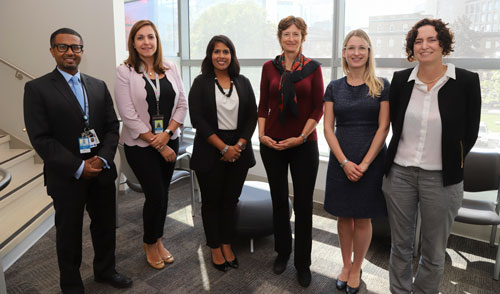Winter (Volume 28, Number 4)
Summary: The First Annual
Cardio-Rheumatology Scientific Day at
Women’s College Hospital
By Keith Colaco, PhD Candidate;
Shadi Akhtari, MD, FRCPC;
Paula Harvey, MBBS, PhD; and
Lihi Eder, MD, PhD
Download PDF
The Women’s College Hospital (WCH) Cardio-Rheumatology
Program was established in 2017 as part
of a wider collaborative network within the University
of Toronto (U of T), to address current gaps in knowledge
and care of cardiovascular diseases in patients with
chronic rheumatic diseases. Through a collaborative model
of care between rheumatologists, cardiologists and other
allied health care providers, the program aims to improve
the management of cardiovascular diseases in these patients
through research, education and advocacy. Importantly,
there are gaps in diagnosis and treatment of cardiovascular
risk factors in this patient population, partly due
to unawareness of the increased cardiovascular risk, and
limited knowledge about and research into cardiovascular
prevention strategies. To address these issues, the program
hosted their first annual Cardio-Rheumatology Scientific
Day at Women’s College Hospital on September 14, 2018.
The event brought together 120 attendees, including physicians,
nurses, allied health professionals, scientists and
students.
The event had informative lectures from experts in the
field on the association between inflammation, cardiovascular
disease and rheumatic diseases. Dr. Husam Abdel-Qadir
(cardiologist and scientist, Women’s College Research
Institute (WCRI), WCH and U of T) opened the day by
outlining the role of inflammation in atherosclerosis and
the use of anti-inflammatory and biologic medications to
aid in prevention of cardiovascular disease. Dr. Lihi Eder
(rheumatologist and scientist WCRI, Co-Director Cardio-Rheumatology Program, WCH and U of T) discussed
the link between inflammatory arthritis and cardiovascular
risk. She also presented data from WCH’s Cardio-Rheumatology
Clinic, highlighting that 54% of patients seen in
the clinic required changes in treatment, such as initiation
of medication to lower cholesterol or high blood pressure.
Dr. Shadi Akhtari (cardiologist, WCH), who runs the weekly
cardio-rheumatology clinic, highlighted different approaches
to assess and treat cardiovascular risk in rheumatic
patients. These included the use of advanced imaging and
recommendations for different types of medications. Dr.
Paula Harvey (cardiologist and scientist WCRI, Co-Director
Cardio-Rheumatology Program, WCH, and U of T) shifted
the focus to lupus by providing case presentations and outlining
its associated heart conditions, such as anti-malarial
induced cardiomyopathy. Dr. Bindee Kuriya (rheumatologist,
Sinai Health System and U of T) reviewed therapies
and strategies for cardiovascular disease prevention in patients
with rheumatoid arthritis. As rheumatoid arthritis
is a “whole body” disease, she stressed the importance of
multidisciplinary models of care needed to control disease
activity and treat traditional risk factors (such as diet, smoking
and obesity). Dr. Kate Hanneman (cardio-thoracic radiologist,
Toronto General Hospital and U of T) described
the strengths and limitations of using different imaging modalities
(such as MRI and CT) to detect inflammation or lack
of oxygen supplied to the heart and arteries.

WCH Cardio-Rheumatology Scientific Day speakers (left to right): Dr. Husam Abdel-Qadir,
Dr. Shadi Akhtari, Dr. Bindee Kuriya, Dr. Paula Harvey, Dr. Kate Hanneman and Dr. Lihi Eder.
Following their lectures, the experts participated in a
panel to discuss how to manage cardiovascular risk. Some
of the topics discussed included the challenges related to
delivery of care between rheumatologists, cardiologists and
family physicians, the effect of non-steroidal anti-inflammatory
drugs on cardiac risk, approach to screening for
anti-malarial cardiac toxicity and others.
Overall, the event brought together healthcare providers
of different disciplines to shed light on an area that is not
well known in rheumatology. To reduce the burden of cardiovascular
morbidity and mortality, more research is needed
in the area to inform development of disease-specific guidelines.
Since rheumatic patients are also likely to have other
co-morbidities, collaboration among family physicians, specialists
and allied health professionals is needed to reduce
cardiovascular risk. Looking to the future, early intervention
and prevention of heart disease will require the development
of disease-specific models that accurately stratify patients
according to their risk of developing cardiovascular events.
Keith Colaco, PhD Candidate,
Institute of Medical Science,
University of Toronto
Toronto, Ontario
Shadi Akhtari, MD, FRCPC
Division of Cardiology,
Women’s College Hospital,
Toronto, Ontario
Paula Harvey, MBBS, PhD
Division of Cardiology,
Women’s College Hospital,
University of Toronto,
Toronto, Ontario
Lihi Eder, MD, PhD
Division of Rheumatology
Women’s College Hospital,
University of Toronto,
Toronto, Ontario
|
